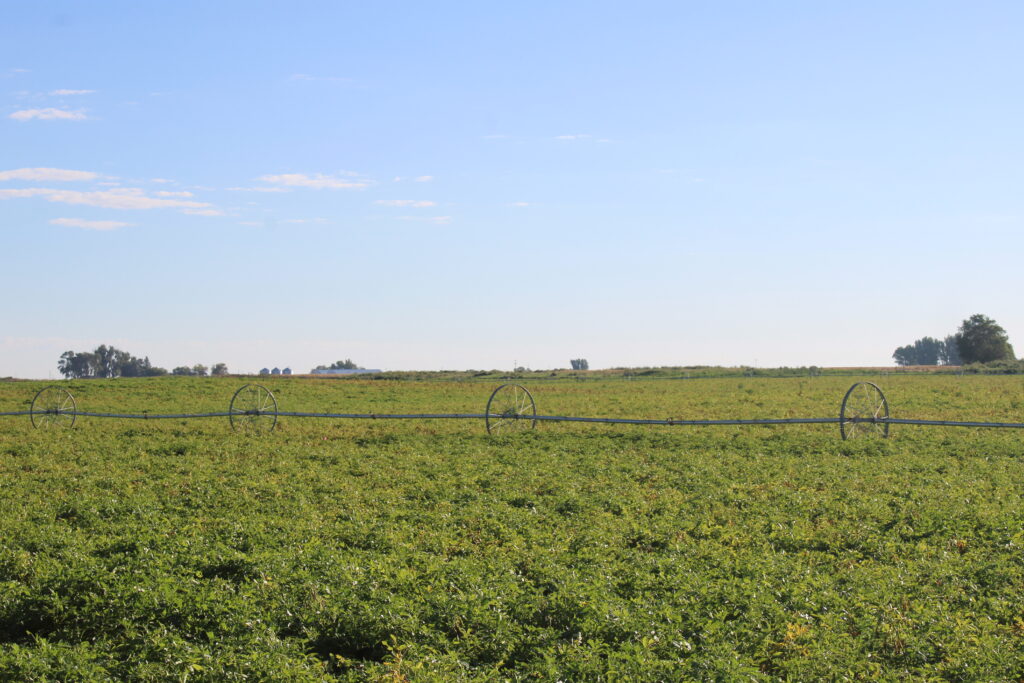
A Regenerative Framework
Scott Poulson Farms working to ‘empower the soil’ for future generations
(Sponsored) Austin Poulson, manager of Scott Poulson Farms, is a fifth-generation farmer in Aberdeen, Idaho. Poulson’s crop rotation includes sugar beets, wheat and, of course, potatoes. The farm maintains four varieties of potatoes including Norkotah, Russet Burbank, round reds and round yellows.
Poulson has worked closely with McCain to implement Regenerative Agriculture practices to improve soil health and increase productivity. Poulson has been experimenting with cover crops over the last five years and has seen promising results in the overall soil and plant health and quality of potatoes.

Poulson hosted a Farm Innovation Hub Field Day on Aug. 24 at his operation in Pocatello, Idaho. McCain employees and growers from across the country as well as parts of Canada attended the hub, learning about Poulson’s Regenerative Ag practices and its successes with the use of renewable energy, innovative technology and sustainable practices.
The main focus of the innovation hub was targeting armored soil, crop diversity and integrating livestock indicators within the McCain Regenerative Ag Framework.
The University of Idaho, a close partner with McCain, was present at the innovation hub. Specifically, Dr. Linda Schott, assistant professor and extension specialist at the University of Idaho and Courtney Cosdon, soil health extension instructor at the University of Idaho both led impactful sessions regarding the importance of soil health.
According to McCain, the importance of armoring soils is multifaceted. Some benefits of cover crops include improving water infiltration, increasing crop diversity, preventing soil erosion, increasing ground cover, conserving soil moisture and enhancing overall soil microbiology. Enhancing crop diversity by using a multi-species cover crop can increase the diversity of the soil microbial community, leaving a positive impact on resilience, crop yields, nutrient cycling and profitability.
“What I have seen through the years of doing cover crops is that the holding capacity of the farm’s water is just better,” Poulson said. “The potatoes have the water that they need, and the potato’s health is still intact. There is a benefit to Regenerative Ag practices and to empowering the soil. We have been really happy with the efforts we put in to cover crops. With McCain’s help and direction, we’ve been able to keep moving forward.”
McCain’s Regenerative Agriculture Framework measures progress based on seven indicators:
- Armored soils preferably with living plants
- Enhanced crop diversity
- Minimized soil disturbance
- Reduced toxicity of pesticides
- Enhanced farm and ecosystem biodiversity
- Reduced agro-chemical impact and optimize water use
- Increased soil organic matter
“With McCain’s direction, our goal is to maximize what our farms can do while staying productive,” Poulson said. “It’s important that if we want the story to be told right we’ve got to be proactive and take control to benefit generations to come. Having McCain be there and give access to information and wisdom has played a big role in our success.”
McCain is committed to bringing smart and sustainable agriculture techniques to growers across the world, continuing to build their Regenerative Ag framework through education, research partnership, data collection and more. By 2030, McCain plans to implement their Regenerative Agricultural practices across 100% of their potato acreage worldwide.
New potato varieties
The development of new varieties is crucial for maintaining the supply of potatoes. McCain is promoting new varieties including Teton Russet, Dakota Russet, King Russet and Caribou Russet. These new varieties have improved traits around disease and pest resistance, environmental stress tolerances and nutrient and water use efficiency, according to McCain. The new varieties also deliver higher-quality potatoes to McCain factories with low defects, blocky shape and increased soils.
“As we select varieties, we’re trying to focus on our Regenerative framework,” said Nicole Nichol, McCain’s North America director of seed and variety development. “New varieties are critical to achieving more with less while having positive yield and quality. We’ve really grown our new variety program and want to have the best quality seed once it gets to the seed grower.”
To learn more about McCain, visit www.mccain.com/sustainability/smart-sustainable-farming.
© 2023 McCain














